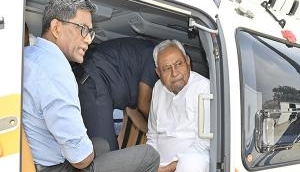Stand up for the national anthem please: Going to a cinema to reinforce patriotism

The Supreme Court's order passed on 30 November - that the national anthem should be played in all theatres while the national flag flutters on the screen - exposes the lack of 'underconfidence' of the establishment and the nation itself.
There are various issues that have been thrown up by this judgement apart from the immediate one about why there should be a judicial imposition of nationalism when the Executive is doing the job rather well and vehemently, if one can say so.
Is the judiciary lending the mighty Executive a helping hand or is there a feeling among learned judges that it is not jingoistic enough?
The judgement has far-flung implications beyond the five-minute homage to nationalism at the beginning of a movie.
It is difficult to understand what purpose is served by playing the national anthem in a theatre. A cinema hall - where all sorts of violent or tawdry films are screened - is not the place for such a sacrosanct song. So before we see a movie glorifying violence, or commodifying women, will the singing of the national anthem, serve to purge us of our guilt?
Of bad movies and good nationalism
The practice, effectively, forces us to reassert our patriotism every time we see a movie or go anywhere else to entertain ourselves.
What has allegiance to the nation got to do with the watching of a terrible movie in which all the larger notions of a just life are splintered? What is the intention here?
What if the movie itself is against the notions of nationalism, which it will be if the movie is an objective bio-pic of Rabindranath Tagore himself. Such a movie will clearly have this pronouncement of Tagore who turned against the notions of nationalism and national boundaries.
This is what the author of Jana Gana Mana said: "India has never had a real sense of nationalism. Even though from childhood I had been taught that the idolatry of Nation is almost better than reverence for God and humanity, I believe I have outgrown that teaching, and it is my conviction that my countrymen will gain truly their India by fighting against that education which teaches them that a country is greater than the ideals of humanity."
Right and rights
The judgement is in keeping with the ascendancy of extreme right-wing discourse in the country since 2014.
Sewn into this discourse is the belief that a country and a nation are built according to a puritanical imagination where the dirty, the rebels, the jailed, the starving, the criminals and those criminalised by the State have no place or entry.
Such occasions are also used to single out people who are seen as enemies of the nation because they chose to sit down during the playing of the national anthem.
In the US for instance, over the last two months, black players in the National Football League have chosen to kneel down as the national anthem is played in protest against the treatment of blacks in the country.
President Obama found no fault with such an action. In fact, he supported it. This is how modern,confident nations should actually behave: by giving space to rebels and outliers to question the notions of nationhood and justice.
Last year, actor Ameesha Patel was trolled for refusing to stand while Jana Gana Mana rang out at a PVR theatre in Mumbai. She said she had a "girly problem" and called the person who Facebooked her picture in the cinema hall a "jackass".
Now such instances of harassment, mostly of minorities, will increase. The Supreme Court has just given these trolls full sanction.
So, where does the national anthem ideally belong?
The national anthem should be played only on occasions where nationality or nationhood is the prime reason or logic. International sporting events like the Olympics, for example, are the right place for the reassertion of nationhood since countries compete against one another to assert physical supremacy. In a cinema hall, no such issue is at stake.
The playing of the national anthem in a theatre is a relic of the pre-television days when propaganda or short films (newsreels) made by the government had to be screened by law.
The Prevention of Insults to National Honours Act, 1971, does not prescribe a punishment for sitting during the national anthem. Only if someone prevents its singing or causes "disturbance to any assembly engaged in such singing shall he be punished with imprisonment for a term which may extent to three years".
However, the Home Ministry Rules state that citizens must stand in attention when the anthem is sung.
However, the rules also say that indiscriminate playing of the anthem should be discouraged. Playing the anthem at the cinema hall is not among the occasions mentioned in the ministry guidelines. The SC judgement now changes this.
A movie screening is not a nation-sponsored event. The fact that as citizens we are required to reassert our patriotic values just before watching Salman Khan beat up a thug is nonsensical.
In fact, in many films, villainy is the main attraction and Bollywood baddies are more talked about than the heroes. Why should we sing the national anthem before we embrace villainy, violence and double entendres?
The views expressed here are personal and do not necessarily reflect those of the organisation.
Edited by Jhinuk Sen
First published: 30 November 2016, 6:26 IST




![BJP's Kapil Mishra recreates Shankar Mahadevan’s ‘Breathless’ song to highlight Delhi pollution [WATCH] BJP's Kapil Mishra recreates Shankar Mahadevan’s ‘Breathless’ song to highlight Delhi pollution [WATCH]](https://images.catchnews.com/upload/2022/11/03/kapil-mishra_240884_300x172.png)

![Anupam Kher shares pictures of his toned body on 67th birthday [MUST SEE] Anupam Kher shares pictures of his toned body on 67th birthday [MUST SEE]](https://images.catchnews.com/upload/2022/03/07/Anupam_kher_231145_300x172.jpg)






